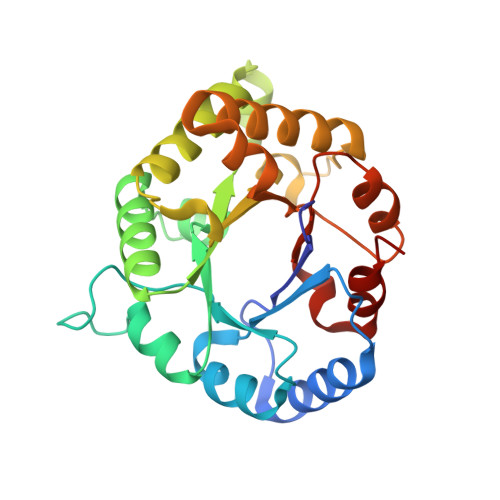Closed conformation of the active site loop of rabbit muscle triosephosphate isomerase in the absence of substrate: evidence of conformational heterogeneity.
Aparicio, R., Ferreira, S.T., Polikarpov, I.(2003) J Mol Biol 334: 1023-1041
- PubMed: 14643664
- DOI: https://doi.org/10.1016/j.jmb.2003.10.022
- Primary Citation of Related Structures:
1R2R, 1R2S, 1R2T - PubMed Abstract:
The active site loop of triosephosphate isomerase (TIM) exhibits a hinged-lid motion, alternating between the two well defined "open" and "closed" conformations. Until now the closed conformation had only been observed in protein complexes with substrate analogues. Here, we present the first rabbit muscle apo TIM structure, refined to 1.5A resolution, in which the active site loop is either in the open or in the closed conformation in different subunits of the enzyme. In the closed conformation described here, the lid loop residues participate in stabilizing hydrogen bonds characteristic of holo TIM structures, whereas chemical interactions observed in the open loop conformation are similar to those found in the apo structures of TIM. In the closed conformation, a number of water molecules are observed at the projected ligand atom positions that are hydrogen bonded to the active site residues. Additives used during crystallization (DMSO and Tris molecules and magnesium atoms) were modeled in the electron density maps. However, no specific binding of these molecules is observed at, or close to, the active site and the lid loop. To further investigate this unusual closed conformation of the apo enzyme, two more rabbit muscle TIM structures, one in the same and another in a different crystal form, were determined. These structures present the open lid conformation only, indicating that the closed conformation cannot be explained by crystal contact effects. To rationalize why the active site loop is closed in the absence of ligand in one of the subunits, extensive comparison with previously solved TIM structures was carried out, supported by the bulk of available experimental information about enzyme kinetics and reaction mechanism of TIM. The observation of both open and closed lid conformations in TIM crystals might be related to a persistent conformational heterogeneity of this protein in solution.
Organizational Affiliation:
Instituto de Física de São Carlos, Universidade de São Paulo, Av. Trabalhador SãoCarlense, 400, São Carlos, SP 13560-970, Brazil.














